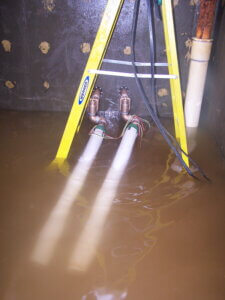What Is an Effluent Pump?
Effluent pumps are key devices in septic systems and for many liquid waste uses. An effluent pump is designed to move wastewater with small solids up to 3/4 inch in diameter, managing the wastewater of your home, business, or industry to make sure liquid waste is efficiently dealt with and treated.
When gravity can’t do the job, such as when septic tanks or treatment sites are higher than where the wastewater comes from, effluent pumps work up to 3,450 rpm to move the water up to the drain. When the sewage from your house needs to go uphill, that’s when an effluent pump comes into play. These machines solve complex problems in waste management to keep your surroundings clean.
How Does an Effluent Pump Work?
An effluent pump uses spinning power to move contaminated fluid through pipes. These machines consist of three key components: a spinning blade, a motor, and a case. Typically, they’re crafted from durable iron or robust plastic, chosen for their strength or lightweight properties.
Once activated by a floating switch, the blade rapidly spins, generating a powerful suction that draws in waste liquid and propels it through a pipe. Effluent pumps are specifically designed to operate in water, with a standard unit for an average home of 2,385 square feet requiring 1/2 horsepower, handling up to 5,000 gallons every hour. You can check how effectively the pump is working by how fast and how high it moves the water.
Effluent Pump vs. Sump Pump: What’s the Difference?
These two types of equipment play distinct roles in water control. Sump units excel at keeping basements dry, handling clear water or rain. Effluent units deal with the mix of liquids and solids from your home’s plumbing system, making them essential for wastewater control.
The key distinction between a sump pump and an effluent pump lies in their capabilities. Effluent pumps have wider impeller vanes, allowing them to process small solids without getting stuck. They work hard in septic systems and wastewater plants, tackling a mix of liquids and solids. Their special design makes them key for wastewater control. Sump pumps, with their narrower impeller design, can’t do this. While less flexible, they excel at their main job: keeping basements dry and free from floods.
Grasping these nuances proves crucial when tackling water management challenges. Whether you’re protecting your family home or looking for the right machine as a professional, knowing when to use an effluent model or a sump unit can prevent costly errors and ensure effective, long-lasting water control.
Types of Effluent Pumps

Effluent pumps come in different shapes and sizes. The most common type is the submersible pump, which works while completely submerged in wastewater. Despite its compact size, the submersible pump’s robustness makes it ideal for your home septic system. Non-submersible models sit above the water level and are used when submerging the equipment underwater isn’t possible.
High-head effluent pumps are built for jobs that need more upward push. These machines excel at moving wastewater uphill or over long distances, making them particularly suitable for complex septic setups or business environments. Little Giant, Liberty Pumps, and Zoeller are well-known brands in this field, with good reputations for efficiency and longevity.
Grinder pumps are a special type of pump that contain a grinding part, turning solid waste into a liquid mix before pumping it. This helps waste flow easily through smaller pipes and prevents clogging.
Common Applications of Effluent Pumps
In the realm of wastewater management, effluent pumps are indispensable. These specialized machines are essential parts of your home septic system, moving partly cleaned wastewater from septic tanks to drain fields for final cleaning. If you have basement bathrooms or below-ground plumbing fixtures, these will typically need pumps to move wastewater up to the main sewer line.
Businesses that use substantial amounts of water, such as restaurants and hotels, rely on effluent pumps. These powerful devices handle the demanding job of moving large amounts of wastewater, keeping water flowing seamlessly through various treatment steps. City wastewater treatment plants also use pumps at different stages, allowing the whole process to work efficiently.
Many industries find effluent pumps critical in managing process water and other liquid waste products. Farmers use them in irrigation systems, tending livestock, and controlling runoff wastewater. As essential tools in modern wastewater management, effluent pumps show their value across many different industries.
Why Shop at Allied PHS?
At Allied Plumbing & Heating Supply Co., you’re sure to find the right device for your specific needs. We’re the go-to place for every type of effluent pump, stocking a wide range of high-quality products from renowned brands.
Our experienced team will help you pick the best equipment, taking into account important factors such as how much the device can handle, how much power you need, and where you’ll put it. This personalized service makes sure you get a machine that works exceptionally and perfectly fits your system.
Without cutting corners on quality, we offer great value by selling the best products at fair prices. With free estimates and same-day delivery in Chicago, we always put our customers first. As your partner, we’ll be here for you even after you buy, ready to help you keep your wastewater management system running seamlessly for years to come.
Get Expert Advice Today
Selecting the right effluent pump guarantees optimal performance and durability for your system. At Allied Plumbing & Heating Supply Co., our staff offers expert guidance to help you make the best choice. With our comprehensive knowledge, we’re here to guide you through the selection process, ensuring you get the exact plumbing supplies you need. We always tailor our recommendations to fit your individual needs.
Proper installation and maintenance of your wastewater system are crucial for its efficient operation. We’ll make sure you know how to set it up and keep it running efficiently over time. If you have any questions or concerns about your setup, our team is ready to provide assistance. Contact us to access our expertise and discover the ideal solution for your plumbing requirements.
22 – Submersible Pumps Installed, 27 Apr 2017 by David Luders is licensed with CC BY-SA 2.0

